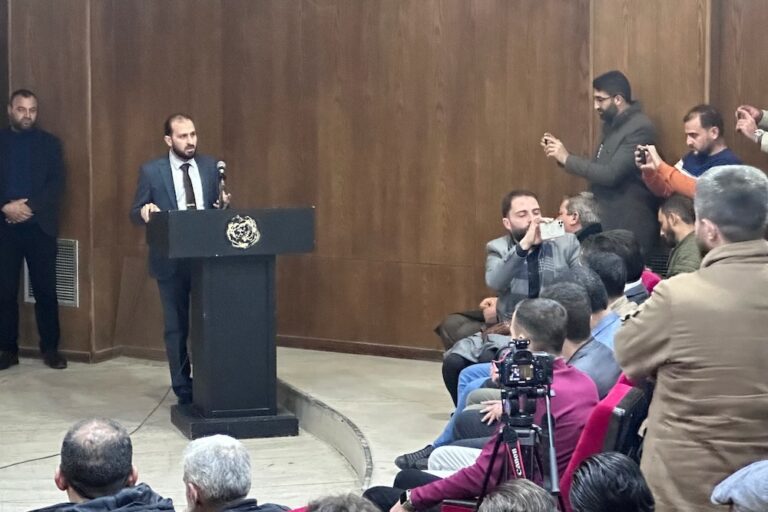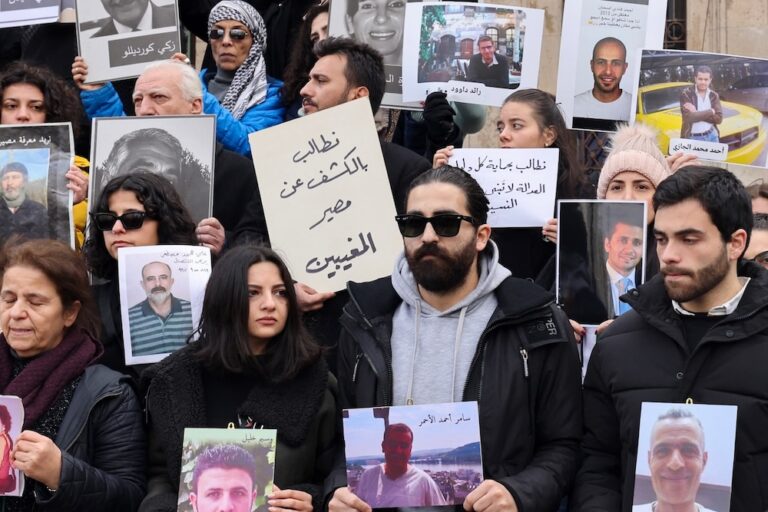(WAN/IFEX) – The following is a WAN press release: **Updates IFEX alerts of 1 April 1999, 29 September, 17 September and 10 September 1998, 11 October and 27 January 1995** Paris, 4 October 1999 For immediate release Journalist Near Death In Syrian Prison Syrian journalist and democracy advocate Nizar Nayouf is near death in prison […]
(WAN/IFEX) – The following is a WAN press release:
**Updates IFEX alerts of 1 April 1999, 29 September, 17 September and 10
September 1998, 11 October and 27 January 1995**
Paris, 4 October 1999
For immediate release
Journalist Near Death In Syrian Prison
Syrian journalist and democracy advocate Nizar Nayouf is near death in
prison following years of torture and lack of suitable treatment for cancer
and other diseases, according to the World Association of Newspapers.
Mr. Nayouf, who is being held in an isolation cell in a Syrian military
prison, has survived three assassination attempts while in jail, but the
culminative effects of injuries from torture and disease are taking their
toll, said the Paris-based WAN.
“Mr. Nayouf should be released immediately, both because he is innocent and
so that he can receive adequate medical treatment – his only hope after
years of hideous torture and illness,” said Timothy Balding, Director
General of WAN. “His case, and others like it, should be raised with every
country that pursues political or business relations with the
Syrian regime. At least nine journalists are currently being held in prison
in Syria.”
WAN has learned there have been three attempts to kill Mr. Nayouf in jail.
The assassination attempts — by poisoning with arsenic and other chemicals,
and by instigating a fight with another inmate — have failed for a variety
of reasons, including aid provided to Mr. Nayouf by sympathetic jailers.
“We believe the authorities want him dead because he has information on
Syrian human rights abuses,” said Mr. Balding.
While in jail, he was an eyewitness to the torture and death of well-known
Syrian broadcaster Muneer Al-Ahmed.
Nizar Nayouf’s story is told below.
“Isolated from the World”
Nizar Nayouf spends his days alone, near death, in a four-square-meter cell.
He hasn’t seen daylight for nearly eight years.
It might sound like a dungeon out of Dickens, but this is today, at the turn
of the new century, in modern-day Syria.
Since January, 1992, Mr. Nayouf has lived in a solitary confinement cell,
isolated from the world. He has not been allowed outside to see the sun, or
even for the ‘breathing time’ allowed to other prisoners, since he was
jailed.
For the “crime” of calling for democracy, Nizar Nayouf has been virtually
buried alive in a fetid cell, his body covered with sores, the remnants of
cigarettes stumped out against his skin. He has been beaten so severely he
is partially paralyzed from the waist down, is nearly blind, and is nearly
deaf in his left ear. He suffers from lymphatic cancer, liver disease and
ulcers but is being denied full treatment.
He has been subjected to the most excruciating forms of torture — tied to
the notorious “German chair,” which stretches the spine; thrown into an
electrified bath; and, in a head-over-heels crucifixion, hung by his feet
for two to three hours a day for a month.
And, while he was hanging by the feet, he was beaten with an iron pipe, or a
steel cable.
Following another beating, guards urinated on his broken skull in a mock
“baptism” after he refused to pray, in a ritual required of other inmates,
before a portrait of President Hafez al-Assad: “Your Grandeur! I witness
that you are above humankind and below God, sent here to prophesy and save
the nation! You are in the right. We are in the wrong.”
This is what it means to be a political prisoner in Syria today. Nizar
Nayouf was sentenced to forced labor for being a member of an “unauthorized”
organization — the Committee for the Defense of Democratic Freedom in
Syria, for which he is Secretary General — and for disseminating “false”
information — he was also editor of the CDF’s
monthly journal, “Democracy’s Vote”.
He spent his first ten months of detention in Saydnaya prison, in the
suburbs of Damascus, where he attempted to organize a prisoners’ rebellion.
As punishment, prison authorities transferred him to the notorious military
prison of Palmyre, in the Syrian desert.
In protest at the torture inflicted on prisoners at Palmyre, Nizar Nayouf
went on a hunger strike for 13 days in 1993 which left him very weak.
Numerous prisoners die under torture in Palmyre; Nizar Nayouf smuggled out
evidence of this and was again transferred, as punishment, to the military
prison of Mezze in Damascus, where he remains.
The military authorities holding Nizar Nayouf have made it clear that he
will only receive additional medical treatment if he pledges to refrain from
political activity and signs a statement acknowledging that “he made false
declarations concerning the situation concerning human rights in Syria.”
Nizar Nayouf remains defiant, and he needs outside support. The World
Association of Newspapers has launched a campaign for his release. Details
of the campaign, along with a model letter to send to the Syrian government,
can be found on the WAN web site at www.wan-press.org, or by contacting the
WAN Secretariat, 25 rue d’Astorg, 75008 Paris France. Tel +33 1 47 42 85 00,
fax +33 1 47 42 49 48. E-mail: contact_us@wan.asso.fr.
Several dozen newspapers belonging to WAN member organizations and many
individuals and international organizations have already joined the
campaign, but more letters are needed. Time is running out for Nizar Nayouf.
The Paris-based WAN, the global organization for the newspaper industry,
defends and promotes press freedom world-wide. It represents 17,000
newspapers; its membership includes 61 national newspaper associations,
individual newspaper executives in 93 countries, 17 news agencies and seven
regional and world-wide press groups.


